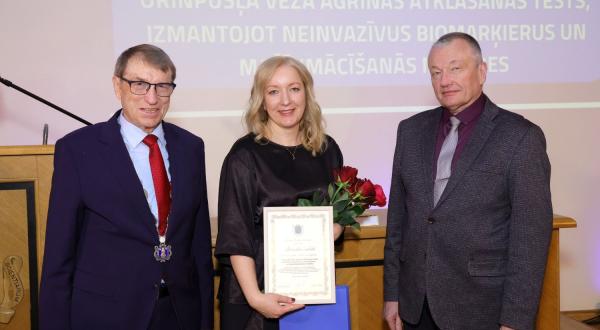Think Tank Certus: RSU Will Contribute 438m Euros to Economic Development in the Next Three Years
The think tank Certus has conducted a study on Rīga Stradiņš University’s (RSU) contribution to higher education export and economic development. The study concluded that RSU higher education export in 2020 will generate a direct contribution of 49.6m euros to the Latvian economy and an indirect contribution of 6.6m euros to GDP, which will increase Latvia's GDP by 96.2m euros. In addition, they predict that the Latvian economy will receive an additional 438m euros due to the export of RSU higher education services between 2021 and 2024.
For several years in a row, RSU has been the leader in attracting international students to the Baltic States. Currently, more than 2,300 international students are studying at RSU, most of them from EU countries: 40% from Germany and 38% from Scandinavia.
During the 2015/2016 academic year, RSU international students’ total contribution to the Latvian GDP was 56.7m euros. RSU’s contribution to GDP has more than doubled over five years.
The funding sources for the expenses of almost all RSU international students come from abroad. For example, 84% of respondents pay for their studies from personal, or family savings, which has a positive impact on the state service account balance. Additionally, international students at RSU have indirectly created 1,040 jobs in Riga and pay taxes to the amount of at least 15m euros. Guests visiting international students spend at least 2.3m euros a year in Latvia.
The study concludes that international students at RSU are satisfied with their studies in Latvia. 85% of students say that they would have chosen the same RSU study programme if they had to look for study opportunities again.
The think tank Certus has the following recommendations to higher education policy makers:
- RSU is the leading institution of higher education export in the Baltic States and the leading university of healthcare and medicine in Latvia. The scale of activities at RSU provides a basis for establishing a centre of excellence for healthcare human resource education and continuing education, science and research.
- The first policy proposal is to recognise research universities as separate national level strategic units with an aim to achieve international excellence in education and science. Developing each science university should be regulated by a separate law, providing for rights and obligations, study and science tasks, localisation of territorial development centres and with development plans for available resources within the National Development Plan as a separate budget expenditure item.
- The second policy proposal is to support the export of higher education and science through budgets or the allocation of EU funds in order to attract international students to high value-added jobs, as well as to provide the necessary skills and competencies in the Latvian labour market. The National Development Plan provides for activities for long-term support of economy, giving priority to export companies with an ability to compete in international markets. Similarly, in higher education and science priority should be given to higher education and science institutions with export capabilities and ability to compete in international markets.
- In the upcoming 2021-2027 planning period, RSU intends to increase its digital training capabilities and competences by maximally approaching 100%. However, it is not possible to ensure quality studies in the field of healthcare and medicine remotely and without interaction with patients. This leads to the conclusion that universities and clinical university hospitals (Riga East Clinical University Hospital, Pauls Stradiņš Clinical University Hospital, Children's Clinical University Hospital) should be gradually integrated for a more efficient use of human resources, infrastructure, administrative and other resources to achieve economic, higher education and scientific aims.
About the think tank Certus
The economic growth of Latvia can only be achieved through a mutual effort. The think tank Certus promotes dialogue between entrepreneurs, scientists and public sector decision makers to create knowledge-based and experience-based development ideas that can guide Latvia along a targeted path of growth, balancing the principles of liberal market economy development with a smart and focused state support for the development of economic sectors.




